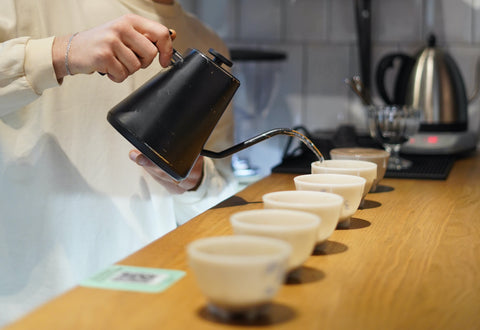Coffee is loved all over the world, and it will always be present in people's morning routine. Today, coffee is a whole culture. However, a cup of this drink is more than meets the eye!
So what is "Specialty" coffee?
Specialty Coffee is a kind of higher grade that makes up only about 10% of all Arabica. These grains are grown in ideal conditions and with special attention to detail.
"Specialty Grades" refers to high-quality coffee that scores 80 or more on a 100-point scale, graded by professionals known as Q-Graders (Quality Graders) , who have experience in sensory evaluation of coffee. They essentially do a job similar to that of a wine sommelier, only in the coffee industry.
Q-graders usually use the cupping method, which involves grinding, brewing and tasting the beans to assess the aroma, taste, level of acidity, sweetness and aftertaste of the coffee. This is a strict test that guarantees that only the highest quality coffees will receive the "specialty-grade" label.
The main requirement for "Specialty" beans is that from the tree to the cup of coffee, they have passed the path of natural cultivation, manual processing, have been sorted from defects and transported to the roastery with attention to quality and safety.
Why does the supply chain play a key role?
The supply chain for "Specialty" coffee is the entire journey of the grain from the farm to your cup! The coffee farm employs many people who work hard to maintain high standards of coffee production. Farmers who grow and process grains with the utmost care are the first step in the logistics chain. They work hard to ensure the quality and taste of their coffee and harvest only the ripest beans. After processing, the grain goes through other quality checks before it goes to roasters like us .
First, we receive test samples from the importer, which we taste to make sure they meet all taste standards. If everything is completely satisfactory to our production specialists, we receive a complete batch of green grain bags.
Guests have the opportunity to watch coffee roasting right in our coffee shop . We roast beans in a coffee roaster made in the Netherlands by Giesen. It is of the drum type and belongs to the contact-type roasting devices, which allows you to get a more complex taste of coffee, unlike other types of heat transfer. And a team of specialists at our production carefully monitors and controls all processes so that your cup of coffee is unsurpassed!
And the last stage is coffee brewing, where the consumer at home or the barista in a coffee shop plays the final key role. Preparing this drink is a kind of meditation. Become a real coffee expert! In our
coffee blog you will find invaluable tips and interesting recipes.
What is the difference between "Specialty" and coffee from the store?
Store-bought coffee is often bitter, too unpleasantly dense, too darkly roasted, and has a muted flavor profile. None of these varieties can compete with the bright flavor bouquet that you can find in "Specialty" coffee from Riverside. Regardless of your taste preferences, this coffee will always surprise your taste buds with delicate and special descriptors.
"Specialty" coffee gives a diverse combination of aromas and tastes: flower, berry, fruit, tea, wine, nut, chocolate and many other notes. In addition, different brewing methods, such as French press, funnel (V60) or espresso, allow you to achieve different textures and flavors. Each method of brewing is a kind of art that allows coffee to reveal its potential to the maximum!
What is the difference between Arabica and Robusta?
Arabica and Robusta are the two most popular types of coffee beans, but only one of them can claim the title of "Specialty".
Robusta is a type of coffee bean that comes from the plant Coffea сanephora . It accounts for approximately 30% of the total coffee production in the world, making it the second most popular. Robusta usually grows at lower altitudes than Arabica and can withstand harsher climates. The main feature of this variety is its sharp bitter taste, which is due to the high content of caffeine. Because of this, Robusta is often used for the production of instant coffee, as it is suitable for the creation of granules and powders, as well as in pharmaceuticals for the manufacture of medicines.

Arabica (Coffea arabica) accounts for about 70% of the world's coffee production, and its history is fascinating! Native to the Ethiopian highlands (Western Ethiopia, Eastern Sudan and Southern Kenya), Arabica has been cultivated since the 15th century in Yemen. These Arabica coffee trees are descendants of plants resulting from spontaneous hybridization (crossing) that occurred over 360,000 years ago between two wild species, Coffea canephora (Robusta) and Coffea eugenioides . Although Arabica contains less caffeine, it is prized for its refined taste and is considered to be of higher quality, which is reflected in its cost and popularity in the market.
Arabica berries on a coffee branch. Photo: Anatoly Korostelev .
So, every time you drink your cup of aromatic, delicious coffee, think about how you feel. After all, each grain from the Riverside range is special and a unique approach was used at the stage of cultivation and roasting!









